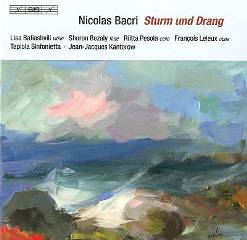Nicolas Bacri - Concertos; Symphony No.4 ‘Sturm und Drang’ (2009)
Nicolas Bacri - Concertos; Symphony No.4 ‘Sturm und Drang’ (2009)

Concerto amoroso, Op. 80, No. 2, "Le Printemps" 1 I. Mosaica 3:33 2 II. Notturno 7:36 3 III. Mosaica II 1:57 Flute Concerto, Op. 63 4 I. Largo misterioso - Allegro moderato 4:55 5 II. Estatico 5:22 6 III. Andante scorrevole 5:21 7 Concerto nostalgico, Op. 80, No. 1, "L'automne" 8 Nocturne, Op. 90 4:14 Symphony No. 4, Op. 49, "Classique Sturm und Drang" 9 I. Allegro fuocoso, "Omaggio a Richard Strauss" 3:31 10 II. Arietta, "Omaggio a Igor Stravinsky" 3:30 11 III. Menuetto, "Omaggio a Arnold Schoenberg" 3:14 12 IV. Finale, "Omaggio a Kurt Weill" 3:27 Lisa Batiashvili - violin Sharon Bezaly - flute Francois Leleux - oboe Riitta Pesola - cello Tapiola Sinfonietta Jean-Jacques Kantorow – conductor
Concerto nostalgico “L’automne” and Concerto amoroso “Le printemps” are the first two panels of Bacri’s work-in-progress Les quatre saisons Op.80, a series of four concertos for oboe and other instruments. The third panel Concerto tenebroso “L’hiver” for oboe, violin and strings was first performed in January 2010. The first performance of the fourth panel Concerto luminoso “L’été” for oboe, violin, cello and strings is to take place in spring 2011.
Concerto amoroso “Le printemps” for oboe, violin and strings is in a single movement in which a long central Notturno is framed by two lively, rhythmically alert outer sections (Mosaïca and Mosaïca II). The outer sections display Neo-classical characteristics whereas the central Nocturne is at times quite intense. The scoring for oboe and cello imbues Concerto nostalgico “L’automne” for oboe, cello and strings with an appropriately autumnal colour. This, too, is in one single movement falling into four sections played without a break. The music unfolds seamlessly from the dark mood of the opening through various contrasting sections (Scherzo alla Fuga and Romanza) before reaching the beautiful, appeased epilogue.
Nicolas Bacri has composed quite a number of concertos or concertante works -some thirty of them up to now (2010). The Concerto for Flute and Orchestra is scored for fairly small orchestral forces (double woodwind, two horns, percussion and strings) and is in three movements. The first movement opens with a slow introduction leading into the main part of the movement Allegro moderato that nevertheless allows for a variety of moods. The second movement Estatico is a Nocturne of sorts - one with some very dark corners. The final movement opens with some energy, but moods vary again until the music reaches its conclusion in a night music à la Bartók in which it eventually thins away calmly.
The short Nocturne Op.90 for cello and strings is in a fairly straightforward arch-form with slow outer sections framing a more animated and tense central one. This compact work is - to my mind - a good example of Bacri’s music-making in that the music says all it has to say with not a single note wasted.
Nicolas Bacri has composed six symphonies so far and his Seventh Symphony will be premiered in autumn 2011. The Symphony No.4 “Sturm und Drang” Op.49 was written for the Orchestre de Picardie of which Bacri was composer-in-residence. The orchestra and its conductor Louis Langrée had dedicated a concert-cycle to “Sturm und Drang” compositions of the late-Classical era and wanted a new work in the same aesthetic. Bacri, however, wanted to write his own music while paying homage to some older beloved composers. The four movements of the Fourth Symphony are thus meant as homage to composers of the early 20th century (Richard Strauss, Stravinsky, Schoenberg and Weill respectively) although the music never directly quotes from or alludes to their music. The work as a whole is also a tribute to a number of other 20th century composers such as Ravel, Prokofiev and Walton. The Fourth Symphony is Bacri’s Classical Symphony paying homage to the musical past without a single hint of pastiche or parody.
One of the more endearing characteristics of Nicolas Bacri’s music is that he never outstretches or overworks his material thus achieving some remarkable concision. This is never at the expense of expression and communication. As early as 1983, when his music was still fairly adventurous, Bacri inscribed a phrase from Tristan Tzara on one of his scores: “I know that I carry melody within me and I am not afraid of it”. The works recorded here - as so much else in Bacri’s output - clearly “carry melody and are not afraid of it”.
All these performances are excellent and superbly recorded, and the whole - Martin Anderson’s detailed and well-informed insert notes included - is up to BIS’ best standards. This is a very fine release by any count. -- Hubert Culot, MusicWeb International
download: uploaded anonfiles yandex 4shared solidfiles mediafire mega filecloudio








